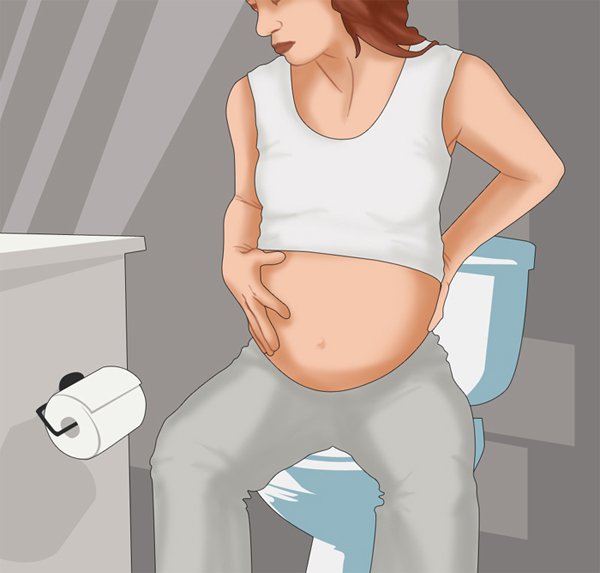The question of whether pregnant women should push when experiencing constipation during pregnancy is a concern for many mothers. Constipation makes the already difficult task of bowel movements even harder, which is why many pregnant women instinctively push when faced with constipation. So, what can be done to escape this situation?
1. The harms of constipation during pregnancy
Constipation during pregnancy causes discomfort, bloating, and fullness for pregnant women. Furthermore, constipation poses risks of various complications such as rectal bleeding, anal fissures, hemorrhoids, and pelvic pain. Prolonged and severe constipation can lead to the accumulation of fecal matter, which can result in the absorption of harmful toxins back into the body, jeopardizing the health of both the mother and the fetus.
Additionally, constipation in pregnant women creates ongoing abdominal discomfort, leading to a lack of appetite and feelings of hunger. This means that the fetus may not receive sufficient nutrients, nor absorb necessary nutrients for normal development. If this condition persists, it poses a risk of fetal malnutrition.

2. Should you push when constipated during pregnancy?
Pregnant women should not push while constipated for the following reasons:
- The contraction pains when constipated will stimulate uterine contractions, which is a cause of early miscarriage in the first trimester and preterm birth in the last trimester of pregnancy.
- When straining to push out stool, pregnant women face the risk of anal fissures – a form of anal inflammation. Anal fissures are often accompanied by symptoms such as bleeding during bowel movements; although the blood may not be significant, it can be detected in the stool or on toilet paper. This is a cause of anal infections and a precursor to hemorrhoids and colon cancer.
3. What should pregnant women do if they are constipated?
Tips for pregnant women suffering from constipation: if you have passed the first trimester, you should use your hands to rub your abdomen in a clockwise direction around the navel to support the activity of the large intestine, which helps soften the stool and makes bowel movements easier. If you are pregnant for less than 3 months or are in the last trimester, pregnant women should avoid this method as it can lead to premature birth or miscarriage.

To effectively and long-term combat constipation during pregnancy, women need to maintain a healthy diet and lifestyle by:
- Drinking enough water: This is extremely important for pregnant women with constipation. Water helps soften stool, so drinking 2-3 liters of water in various forms throughout the day can improve constipation during pregnancy. It is especially advisable to drink water at two effective times: in the morning after waking up and in the evening before going to bed.
- Increase fiber in meals: It includes soluble and insoluble fiber. Soluble fiber absorbs water from the intestines, helps soften stool, increases stool size, and creates a feeling of needing to defecate. Insoluble fiber, when it reaches the large intestine, increases stool bulk and effectively reduces constipation symptoms. Supplement fiber by eating a variety of fruits and vegetables such as cabbage, kale, spinach, plums, kiwi, ripe bananas, and apples… Pregnant mothers should have a diverse intake and avoid eating too much of one thing, while also minimizing spicy, hot, and stimulating foods like chili, pepper, tobacco, alcohol, and beer…
- Regular physical activity: Engaging in 15-30 minutes of suitable physical activity daily will be an effective measure to limit constipation. Pregnant mothers can practice yoga, swim, or walk…
4. Tips for relieving constipation during pregnancy
Some small tips and advice that can help pregnant mothers have easier bowel movements when experiencing constipation are:
- Establish a routine of sitting on the toilet without distractions every day. This can be 5-10 minutes after breakfast, lunch, or dinner. Bring a book or magazine, definitely not a phone, relax mentally, and avoid stress, pressure, or fear while defecating.
- It is advisable to squat, and to be able to squat longer in the bathroom, pregnant mothers can practice the position: Leaning forward with elbows on the knees, using the knees to support part of the weight.
- Avoid ignoring body signals that prompt the need to use the toilet.
- Do not hold back from defecating; if the urge arises, it should be addressed immediately.
- Pregnant mothers with constipation should minimize the use of medications. Enemas can help pregnant mothers have easier bowel movements, but should only be used when truly necessary.
If the constipation during pregnancy is severe and the pregnant mother cannot resolve it through dietary adjustments and shows signs of abdominal pain, she should seek medical advice for timely and appropriate treatment.

